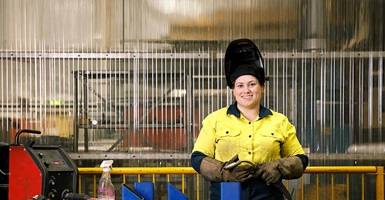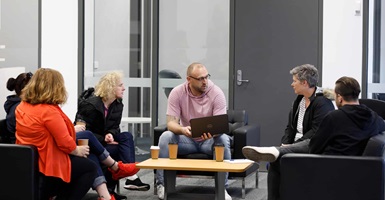Imagine this. It’s one of the most important days of someone’s life – their wedding day – and your job is to make them look and feel amazing by bringing their desired make-up look to life.
As the transformation takes place and you work your magic, you can see how happy they are. How confident. How grateful.
Whether you’re working as a bridal make-up artist, in theatre or special effects, seeing a transformation take place is an incredible feeling, says Chisholm make-up teacher Jane Truong.
“Make-up artistry is a wonderful career because it’s really rewarding seeing people feel empowered,” she says. “If you’re a people person who is creative and likes helping others feel better, make-up is such a well-suited career path.”
So, what’s involved in being a make-up artist and how do you become one? Let’s take a look.
What does a make-up artist do?
Make-up artists use cosmetic products to enhance or alter someone’s appearance, whether they be everyday people, actors, models or performers.
However, Jane says if you have your own make-up artistry business, there can be a whole lot more to the job than just applying make-up.
“As a make-up artist, I’d probably spend about 30 to 40 per cent of my time applying make-up,” says Jane. “The rest is actually spent on admin. This includes emails, responding to enquiries, rescheduling, quoting, invoicing, answering questions, doing my website and
social media, researching products, buying products and testing them.”
Make-up artist career paths
One of the great things about make-up artistry is that there’s a broad range of career paths depending on where your interests lie.
Popular make-up artist career paths include:
Working in a retail setting, for example as a beauty consultant, on brands or an events team or as a make-up trainer educating other sales consultants.
Freelance make-up artistry doing anything from events and bridal make-up to editorial and commercial work.
Theatre make-up artistry on productions.
Television make-up artistry, working with TV personalities.
Working as a special effects make-up artist.
What attributes do you need as a make-up artist?
Jane says you need to be a people person and have strong communication skills to understand what clients want.
“You’ll be interacting with lots of different people, whether you’re doing admin or on the job, so having good communication skills is really important,” says Jane.
Dedication is another key attribute to make it as a make-up artist. “You may have to wake up early or travel really far,” says Jane. “If you have passion, it will push you through the stuff that’s maybe not as fun, like the admin side of things.”
In addition, Jane says creativity and being able to think outside the box will help you do well.
“Sometimes when you’re freelancing, you’re not working in a team environment, so you have to think quickly on your feet,” she says. “Being a strong-problem solver is really useful, as is showing initiative. Think about what else you can help the client with – I’ve helped brides get into their dresses, put flower pins on the bridal party and things like that.”
Make-up artist courses
Jane recommends dipping your toes in with a short course initially (such as Chisholm’s Creating a Flawless Base course or Unmask Your Eyes course). That way, you’ll have a better understanding of whether make-up artistry is the career for you.
If you’re interested in working in the retail space or having your own freelance make-up business, Chisholm’s Certificate III in Make-up is a popular choice.
Make-up artist salary
Salaries range widely, depending on the make-up artistry career path you choose and your level of experience.
As a ballpark, in a retail setting Jane says you might start out earning between $25 and $35 an hour.
As a freelancer, an experience makeup artist may earn anywhere from $100 to $200 per face, so $150 as an average. If you do six faces a day, that’s $900 per day.
For theatre make-up, TV make-up and special effects, it depends largely on your experience and employer. The Australian Government’s Job Outlook website lists the weekly pay for Make-up Artists (under All Performing Arts Technicians) as $1327 per week.
What are the career opportunities like as a make-up artist?
Jane says there are a lot of opportunities out there, but there’s also a lot of make-up artists.
“It’s very competitive,” she says. “I always tell my students it’s not only your make-up work that’s important, but also your customer service and work ethic. There are a lot of artists with a strong skill level, so what will set you apart is your commitment.”
If you want to do well, Jane says you must be prepared to work hard. As a young aspiring make-up artist herself, Jane spent weekends finetuning her skills and building her portfolio. For years, she worked seven days a week, sometimes up to 16 hours a day.
“It’s a hard slog and it’s not as glamorous as everyone thinks, but as long as you’re passionate, you love what you do and you’re willing to put in the hard work and focus on your artistry and your customer service, then I think you can have a promising career in the make-up artist industry.”
Keen to start your freelance or retail make-up career? Take the first step. Learn about the Certificate III in Make-up SHB30215


